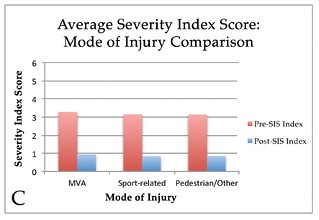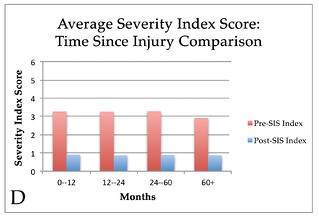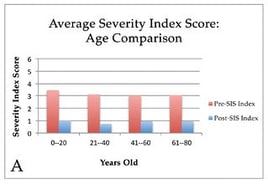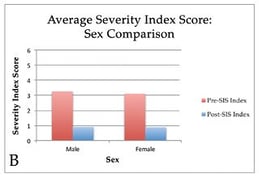On a regular basis, we’re asked if gender and/or age influence one’s ability to recover. We are also asked if how someone was injured, or how long it has been since their injury will influence their ability to recover.
Our research has found that while it is important to understand these demographics, these factors don’t deter the ability to recover in a short period of time.
Because we analyze each patient’s brain functioning, we can create a unique treatment protocol that will effectively help them recover. Every patient here goes through their week of treatment with many of the same types of therapies, but they will participate in different protocols based on their own levels of impairment and their own regions of brain dysfunction. Each patient is given a Severity Index Score based on their brain scans at the beginning of the week and another Severity Index Score at the end of the week after treatment has been complete. This helps us to objectively measure outcomes and improvements.
Treatment Outcomes Based on Age & Sex
While we do recognize and understand that age and sex can both play a large role in the level of risk someone is at for a potential injury, we have found that because we are focusing on each individual’s unique impairments from their injury we are able to target and help them to successfully recover regardless of age. We have treated patients ranging from 8 to 80 years old.
Treatment Outcomes Based on Mode of Injury
We’ve treated a wide variety of injuries including sports injuries, car collisions, falls, accidents, stroke, carbon-monoxide poisoning, and more. Our approach is based on the science behind NeuroVascular Coupling which helps us empower the brain to function as best as it possibly can with what it has. We have even helped a patient who had a hemispherectomy (where only half of the brain has functioning) improve their functioning, which helped reduce symptoms and improved their ability to do everyday tasks.

Treatment Outcomes Based on Time Since Injury
We have treated many patients who have been injured anywhere from a few weeks to 50 years previous. We have found that we are able to clearly understand each person’s brain and target our treatment to those impairments regardless of the time since injury. We had one patient who had been dealing with symptoms for over 50 years. After his treatment he said, “I thought I was just slow my whole life, and now I can imagine that this is how my brain should have worked when I was 25.”

Overall, we focus on treating each brain injury based on its own symptoms and impairments. We use a multi-disciplinary team to individualize each person’s treatment plan. We focus on using a customized approach and applying it to the context and challenges for each individual. This improves treatment outcomes and also gives us a clearer direction for at-home recommendations moving forward after treatment as well.














